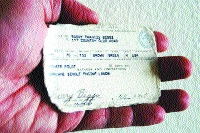New TSA Ruling Generates Concern from Pilots, Organizations
Airmen, check your six. A sweeping motion on Capitol Hill now enables the Transportation Security Administration to declare a pilot, instructor pilot or mechanic a risk to national security, and force the Federal Aviation Administration to revoke or withhold an airman’s certificate—with appeals to be heard only by TSA.
Mandated by Congress under the Aviation Transportation Security Act of 2001, the controversial ruling (Docket Number TSA-2002-13732) was adopted Jan. 24, 2003, without prior notice or opportunity for prior public comment.
“This concerns me deeply because the FAA, which has always had the authority to manage the nation’s airways, is now superseded by TSA,” said Barry Biggs, a general aviation pilot who has been flying since 1968. “In my opinion, it’s a severe overreaction to the fact that some bad guys trained at legitimate flight schools and set forth the events of September 11. And, it’s unlikely that terrorists will use the same methods again.”
Biggs added that he believes the threat is everywhere, not just in general aviation.
“Now, we’re faced with more government bureaucracy and I’m not sure we’re any more secure because of this ruling,” he said.
The ruling is a poor attempt by one government agency to compensate for the failure of others, such as the INS and the CIA.”
Specifically citing the events of September 11, and that “airmen are in a unique position to exercise the privileges of their certificates in support of terrorist activities,” the ruling sets some troubling new precedents, which, according to many, conflict with established legal proceedings for the revocation of such certificates.
As it stands now, the ruling is extremely unclear in how it defines a terrorist, as well as criteria that will trigger TSA action against an individual airman. It simply states that “an individual poses a security threat if the individual is suspected of posing or is known to pose (1) a threat to transportation or national security; (2) a threat of air piracy or terrorism; (3) a threat to airline or passenger security; or (4) a threat to civil aviation security.”
Complicating matters even further is the potential for those affected to be denied the opportunity to inspect the specific evidence collected against them. While there is some provision to request such information and evidence, the ruling allows for much of that data to be classified as “sensitive” and remain exempt from review.
According to the ruling, in most cases, “the determination that an individual poses a security threat will be based, in large part or exclusively on national security information, unclassified information designated as ‘SSI’ or other information that is protected from disclosure by law, such as the Freedom of Information Act.”
“If someone is really a terrorist, they shouldn’t have a pilot certificate,” said Phil Boyer, president of the Aircraft Owners and Pilots Association, “and, frankly, we should take stronger action than just lifting a license. But any American so accused must be guaranteed their basic constitutional protections to due process, and that includes the right to an independent adjudicator.”
Although the ruling allows the affected individual the opportunity to “respond in writing to and provide any information the individual believes the TSA should consider,” there is no opportunity cited for those erroneously accused to meet with them or the FAA to refute the allegations in person.
“There is no question that national security is the highest priority for our government and EAA supports those efforts,” said Tom Poberezny, president of the Experimental Aircraft Association. “We at EAA understand the mission of TSA, but the process, as written, leaves room for abuse by those in the future who may not exercise due diligence.”
Claiming its primary benefit will be increased protection to Americans and others from acts of terrorism, the new ruling is “an integral part of the total program needed to prevent a criminal or terrorist incident in the future.”
Unfortunately, the comment period comes after the ruling; individuals wishing to submit formal comment must do so before March 25, 2003. Comments may be submitted to the Docket Management System, U.S. Department of Transportation, Room Plaza 401, 400 Seventh Street, SW, Washington D.C. 20590-0001. Submitters must identify the docket numbers TSA-2002-13732, TSA-2002-13733 and FAA-2003-14293 at the beginning of their comments. Individuals may also review these documents online and provide comment via Internet at [http://dms.gov].











